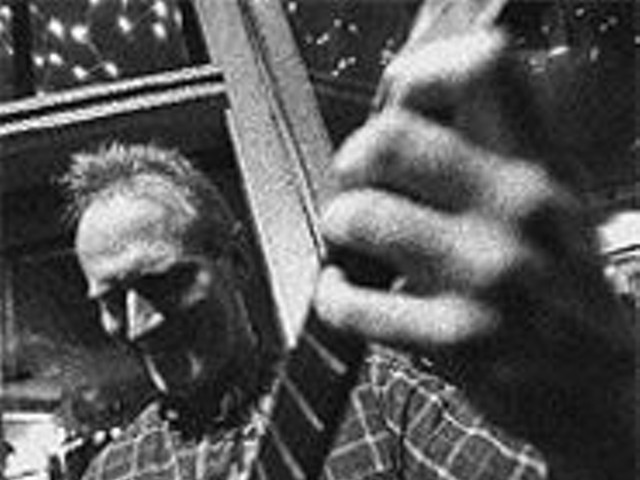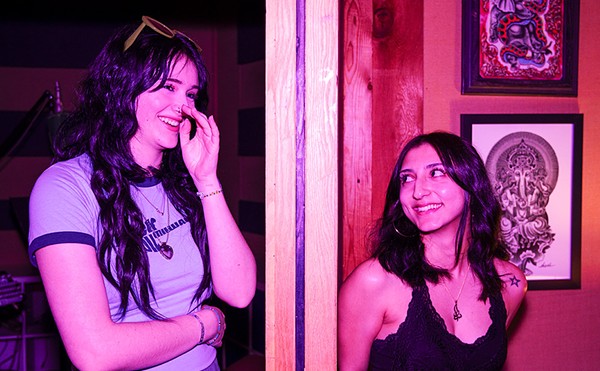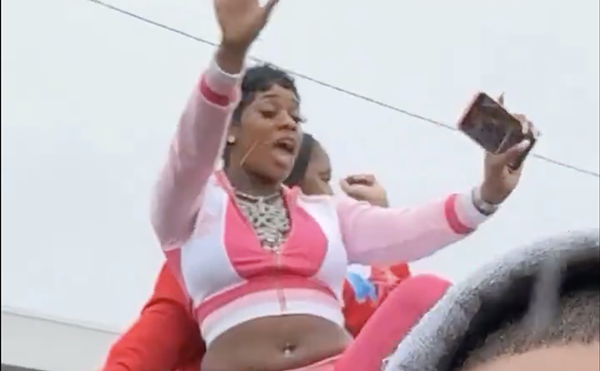Now, it was a Wednesday night, and Lo's capacity is 49 people. The club doesn't have a dance floor; most of the space is occupied by Asian-style floor booths, tables and the bar. When was the last time a rave was held on a Wednesday night, at a place without a dance floor, in a space that holds 49 people?
But, convinced by a voice-mail message on rave promoter Boogie Knights' information line that two of the outfit's DJs would be spinning house at Lo that night, the authorities decide that such an event constituted, in their words, a "rave party," and a small army arrived to shut it down. To anyone remotely familiar with a rave, what comes next isn't surprising: Lo wasn't sponsoring one. No glowsticks. No pacifiers. No excessive water consumption. None of the telltale "warning signs."
The incident was a minor one, a misunderstanding -- the police say they were just following through on a tip and doing their job -- but it suggests the authorities are grappling with confusion as they attempt to understand a culture that seems, to insiders, utterly alien to them.
"I understand that they have to do their jobs, but I think that they need to define what a rave is, and there's a difference between information and misinformation, and they were misinformed," says Lo's owner, Blake Brokaw. "I told them they were misinformed, and they still took it upon themselves to show up with eight cops and fire marshal and Liquor Control. It didn't make any sense. There were as many cops in there as I have customers in there on a Wednesday night. When I think of a rave, I think of 2,000 kids dancing and on drugs."
St. Louis authorities' tolerance of raves has ended, and, like virtually every other city in the country this year, they're bearing down hard on promoters. The police have been closely scrutinizing not only raves but dance clubs (which, in the eyes of the St. Louis police, rent their spaces to rave promoters, who then throw these "rave parties"; they seem unable to differentiate between "club nights" and raves); they've also increased their surveillance of rave-information lines, mailing lists and fliers and have begun referring to glowsticks, pacifiers and lollipops as "club-drug paraphernalia."
The police (including members of the vice squad), along with the Missouri Division of Liquor Control and St. Louis Excise Commissioner Robert Kraiberg, recently held a meeting with Washington Avenue club owners, designed, says 4th District commander Capt. Lawrence O'Toole, to discuss problems specific to the area and approaches to controlling those problems. "What the meeting was about was to say, 'Hey, I'm the new guy here,'" says O'Toole, who took over as captain of the district in April. "'If you need help, tell me what you need. I want to work with you. If you've got underage drinking, or if you've got drugs, the only way we're going to get rid of it is to work together.' Some of the meeting was to educate and to tell them that if you see certain signs, be it glowsticks, or lollipops, Vicks Vapo-Rub or excess water intake," he says, drugs may be present.
The officials indicated that they would be keeping an eye out in the clubs not just for the usual infraction -- underage drinking -- but, says one (and echoed by others) who attended the meeting, "anything that indicates or perpetuates ecstasy use or drug culture: "If we see glowsticks, Vicks, excessive water use -- if everyone in the club is drinking water, no alcohol, it's going to raise our eyebrows. If everyone's got glowsticks, it's going to raise our eyebrows.'
"They're very clear about what they're not saying, but they're also very clear about what we're supposed to understand from what they're not saying," the meeting attendee says. As a result, Velvet no longer sells glowsticks, and the club has been made unavailable to Boogie Knights and That Girl, promotion companies that in the past had frequently booked events there. Club management says police were requesting the names and addresses of these outside promoters.
O'Toole says that the department is simply dealing with the reality of the club culture. "It's a huge concern of mine," he says, "the drugs down here, and the underage people. And it should be." But, he continues, "the only thing the bars have to worry about down there is the same concerns bars have to worry about anywhere, and that's that they're abiding by the liquor laws: The people that drink have to be 21; [the clubs] have to close down at 3 a.m." He denies that the police are dictating who can or can't book events at the clubs; he simply wants to know when these events are scheduled so that the police can be properly prepared to deal with crowds.
The recent vigilance by the authorities stems mainly from rumors of misconduct at two clubs (since closed), as well as a few of the 18-and-up establishments. All cite as another cause for the attention the huge Washington Avenue rave last fall, called Operation: Get Down, that resulted in at least six overdoses, two involving 16-year-olds. Given the constant reporting on rave culture in the media over the past year, the issue was bound hit centerstage on Washington; an epidemic of "club drug" use is assumed to be occurring within the city limits, and it's only natural to examine the clubs where the dance music is being played -- although it seems as if the police are targeting clubs because of the type of music they're playing.
On the surface, that isn't far from the truth: When you see a bunch of kids dancing to house or techno downtown, mesmerized by glowsticks and lifting their Vicks Vapo-Rub-laden masks to guzzle water, chances are, they're high on more than just life. But should the police threaten the liquor licenses of these clubs because some of their clientele may be taking drugs? No more than they should be allowed to threaten a mechanic for a fixing car that may or may not have been involved in a hit-and-run accident.
Two promoters in specific have been affected by the recent police attention, and it's probably not a coincidence that they were responsible for Operation: Get Down. Boogie Knights and That Girl, both of which had a relationship with Velvet in which they booked and promoted evenings at the club, have found themselves at the center of the controversy, either in the form of surveillance (Boogie Knights' information line and fliers) or, in the case of That Girl's Alexis Tucci, smear tactics. Says Tucci, "When the kids overdosed at my party, the cops turned to my friends and said, 'You can thank Alexis Tucci for this.' I'm pissed, because I didn't feed these kids drugs, and if kids can't control themselves, you can't blame the promoter. Riverport, when someone overdoses on alcohol or drugs, they don't blame Riverport. I have had a perfect record for seven-and-a-half years: no vandalism, no disrespect to cops, no illegal events -- always licensed and permitted -- I've jumped through every hoop City Hall has given. And then for them to crack down on me -- the only reason why they know who I am is because I'm the only person who does them in warehouses and goes through all the logistics and gets the proper permits."
A spokesman for Boogie Knights says the scrutiny concerns him and that it's a new thing for his organization: "Until recently, I've never had any reason to feel that way. All our events have been as legal and spic-and-span as they could possibly be, realizing that there is a problem in our scene, as there is in the club scene, and basically in any music scene that caters to a young, almost rebellious crowd. But as far as our events, they've always been legit, and that's why we can say we've put on events for a two-year period now, pretty much every couple of months throwing an event that has gone off, never had an event shut down and very few problems all around." He also says that he understands the police's concern but that they're not differentiating between the honest promoters and the shadier ones, those whose connections with the drug trade are known within the rave community.
Tucci and the Boogie Knights spokesman agree that the rave scene is having problems with drug use at parties, but they are frustrated at the methods the authorities are using to combat them. "The city has made no effort to contact any rave promoter and talk to them one on one," says Tucci. "They've made no effort to find out what this is; why we do what we're doing; who are the good guys, bad guys; who are doing it for the right and wrong reasons; or come to some sort of agreement to overcome this problem."
Until that happens, the police will be chasing misinformation, following leads that, to anyone familiar with the scene, appear ridiculous, and dusting glowsticks and lollipops for fingerprints.





